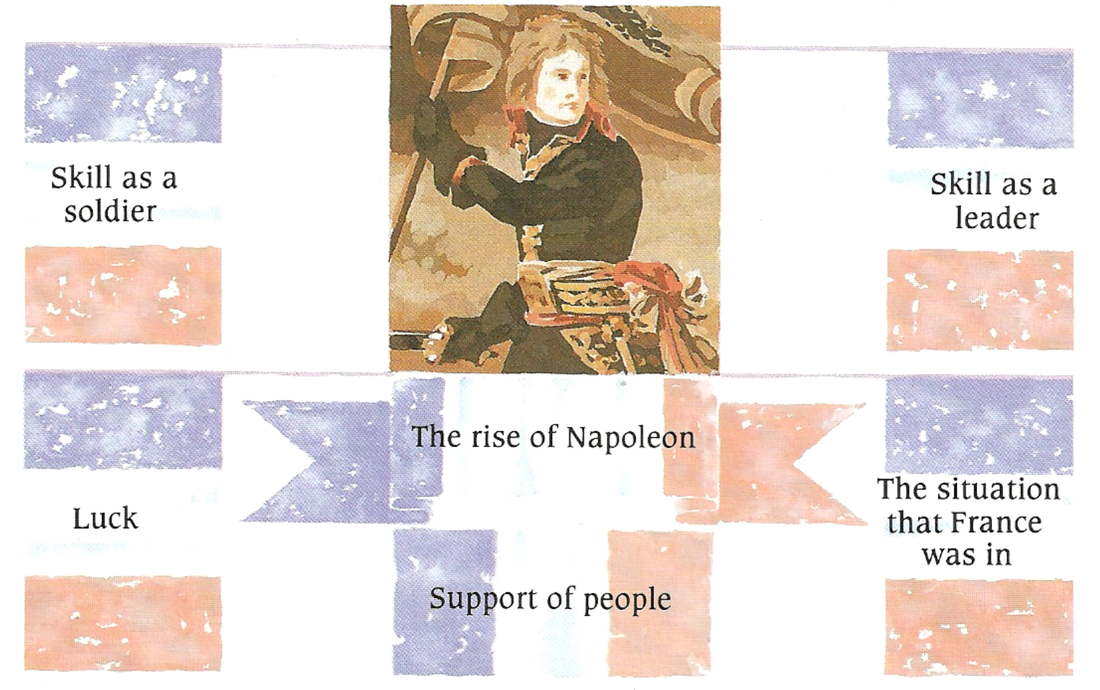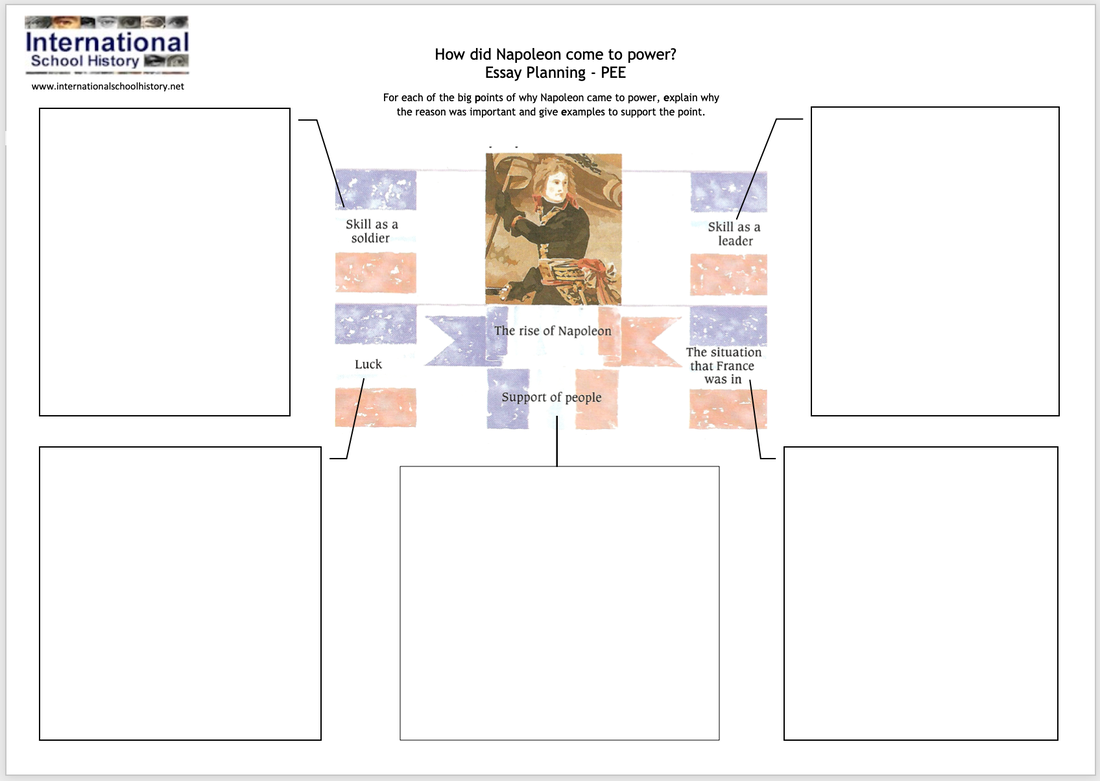Lesson 3 - Napoleon - Rise to Power
|
In this lesson we are going to explain the rise to power of Napoleon. Rather than tell a chronological story, we are going to identify big points or factors, each of which contributes a reason for Napoleon's success.
The five factors are his skill as a soldier, his skill as a leader, the situation that France was in, the support of people and luck. As you read through this section and watch the films, you will need to look out for evidence to support each of those five factors. You will be divided into 4 groups. Each group will watch one short film and look for evidence (facts) to support any of the five big factors. You will then report your findings back to the class. As a class we will also watch two films. |
As we find out about Napoleon you need to start to evaluate which of the five factors you consider to be most important. Remember this is what doing history is all about. If someone asks you 'why did Napoleon come to power?' you don't answer the question by telling the story. You answer the question by ATBQ and making a case in support of your opinion.
Whole class - Childhood and education
|
|
We will watch this first film together as a class. Remember to look out for evidence in support of the five factors.
Napoleon was born on the island of Corsica in 1769. He was the second of eight children. Just a year earlier, the king of France had bought the island from its Italian owners, so Napoleon was born French while his parents were Italian. At the age of nine, Napoleon was sent to school in France. He spent the next seven years in military schools, leaving at sixteen as a lieutenant in the French army. Four years later the Revolution began. As the army grew in size during the Revolutionary war, Napoleon gained rapid promotion. |
|
Group 1 - The Siege of Toulon 1793 Bonaparte was appointed artillery commander of the republican forces at the Siege of Toulon. He adopted a plan to capture a hill where republican guns could dominate the city's harbour and force the British to evacuate. The assault on the position led to the capture of the city, but during it Bonaparte was wounded in the thigh. He was promoted to brigadier general at the age of 24. |
|
|
|
Group 2 - 13 Vendémiaire - Bonaparte crushes a rebellion - 1795
The death of Robespierre did not bring peace to France. There was much fighting on the streets of Paris between revolutionaries and royalists (supporters of the executed King). Elsewhere in France, many people who had sympathised with Robespierre were attacked and in some cases killed. Royalists began to emerge from hiding. France seemed more divided than ever. On 12th Vendemiaire, Year 4 (5 October 1795 by the pre-revolutionary calendar), royalists tried to seize power in Paris and stop the Revolution. Bonaparte, used his guns to smash the rebellion. Bonaparte had started to make a name for himself. |
|
Whole Class - The Italian Campaign - 1796 When the Directors took power in 1795 they continued the Revolutionary war against the Coalition. The French armies by this time were very large, and they quickly conquered Holland and Belgium. Their next targets were the states of northern Italy. This gave Napoleon his next promotion. In 1796 he was made commander of the Army of Italy, with orders to attack Austrian forces in northern Italy. Over the next eighteen months, Napoleon led his armies in a series of brilliant victories over the Austrians in Italy. By October 1797 all of northern Italy was under French control, and Napoleon was France’s most famous general. |
|
|
Source A - Low morale, bad pay
On arriving in, Nice, Napoleon wrote to the Directors: 'One battalion has mutinied on the grounds that it has neither pay nor boots. I will restore order or I will give up this command.' At the same time, he addressed the troops: Soldiers! You are hungry and badly clothed. The government owes you money, but can give you nothing. With me you will find honour, glory and riches.' D.G. Chandler, The Campaigns of Napoleon. 1967 |
Source B - A revived army
The impressive series of victories, plus the loot that followed, further improved the morale of the French troops. They were prepared to fight and die for their young general.' D.G. Wright, Napoleon and Europe, 1984 |
Source C - The returning hero
When Napoleon returned to Paris in December 1797, Madame Junot, the wife of one of Napoleon's generals, reported: 'All classes united to welcome him on his return home. The people cried, "Long live General Bonaparte! Long live the conqueror of Italy!" ' |
|
Group 3 - Napoleon in Egypt 1798
Following his success in Italy, the Directors put Napoleon in command of an 'Army of the East’ with orders were to attack Britain’s trade and colonies in the Far East. Napoleon quickly defeated the Egyptians at the Battle of the Pyramids in July 1798, but he never got to India. Only a week after the battle, the ships which had brought his army to Egypt were sunk by the British Royal Navy at Aboukir Bay, stranding them in Egypt. They could not advance to India, nor could they return to France. Napoleon and his army were marooned in the Middle East for a whole year. In addition, France’s enemies had formed a Second Coalition and had driven them out of Italy and central Europe. |
|
Group 4 - The 18th Brumaire - Napoleon seizes power - 1799.
The government of the Directory had become very unpopular. One of the Directors Emmanuel Sieyès was planning a coup d'état to replace the government. He turned to Napoleon and Napoleon's brother Lucien (who was president of the lower house of parliament) to help. As well as popularity with the public, Napoleon also brought the support of the army that would be essential to a coup. On 9 November 1799, (18th Brumaire according to the republican calendar) they took action. They made up a story that rebels were about to capture Paris, and asked the legislature (Council of Ancients and the Council of Five Hundred) to take emergency action. The Councils did as they were asked and made Napoleon commander of all the troops in the Paris district. Napoleon requested that the Councils leave Paris for a safer meeting place in nearby Saint-Cloud. Soldiers then forced the other three Directors to resign.
|
|
The next day, Napoleon went to the Councils to ask them to change the government. By this time, however, they had discovered that the story about rebels was a lie. They immediately took an oath to defend the Directory. When Napoleon appeared before them, they shouted at him, pushed him around and tried to declare him an outlaw. According to the Council’s own records, angry deputies tried to kill him: Some of the deputies shouted out 'kill! kill!’ They rushed forward trying to grab him, some armed with pistols and knives. The soldiers rushed in and shielded Napoleon from the killers with their bodies. Napoleon's brother Lucien played a critical role in persuading both the Deputies and the soldiers of Napoleon's honest intent. |
Most of the deputies fled when they saw the soldiers, many jumping from the windows. A handful who stayed voted to give Napoleon and two of the other plotters the power to run the country until a new type of government could be formed.
The Consulate - Napoleon the ruler
It took only a month to create a new government. France was to be governed by three Consuls, with only the First Consul having the power to make decisions. The other two Consuls were to advise him. Napoleon took the post of First Consul and thus became the head of the government. France’s 9 million voters were then given the chance to show by voting whether or not they liked this new government. 3 million voted in favour and only 1,500 against. Although 6 million did not bother to vote, Napoleon said that the result showed that the people supported him. The constitution preserved the appearance of a republic but in reality established a dictatorship.
It took only a month to create a new government. France was to be governed by three Consuls, with only the First Consul having the power to make decisions. The other two Consuls were to advise him. Napoleon took the post of First Consul and thus became the head of the government. France’s 9 million voters were then given the chance to show by voting whether or not they liked this new government. 3 million voted in favour and only 1,500 against. Although 6 million did not bother to vote, Napoleon said that the result showed that the people supported him. The constitution preserved the appearance of a republic but in reality established a dictatorship.
|
Activity
1. From the notes you have made on each of the five factors that explain Napoleon's rise to power complete this essay planning sheet in Word, download an image for Notability or design your own version with examples in support of each of the factors. 2. Of the five factors, which do you consider to have been the most important? It is important that you explain your answer carefully. |
Extension and extras
|
Watch the trailer to Ridley Scott's 2023 biopic Napoleon.
How many of the events we have covered in this lesson are referenced in this short extract? |
|


